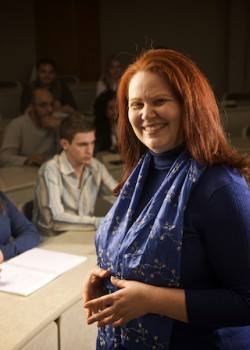Sharing stories to promote peace
Storytelling isn’t just an age-old pastime — it’s a peace-building tool, too. That’s the idea behind the annual Winnipeg International Storytelling Festival put on by the Arthur V. Mauro Centre for Peace and Justice at St. Paul’s College.
“Stories can be a way to understand another person’s experience and how they’re affected by something,” said Jessica Senehi [PhD/00], festival director and associate professor in peace and conflict studies at the Mauro Centre.
This year, nearly 9,000 English and French-immersion students in grades one through twelve will experience personal and cultural stories from around the world thanks to the festival’s school program in which tellers visit schools all around the city. High school students will also come to the U of M to experience campus, listen to stories, and participate in storytelling workshops with students from other schools.
Senehi says the storytellers make a huge impact on students, and recalls when a teacher from Selkirk Junior High contacted her in 2008. Her class wanted to see Ishmael Beah, a former child soldier, speak. Senehi agreed to introduce the class for five minutes, however, Beah stayed to talk with the class for half an hour. At the end of the discussion, a boy stood up in front of 150 people to ask him a question.
“Later the teacher emailed me and said that’s the first time that student ever spoke up — he’d never asked a question in class or anything, but he was just so blown away by the hardship that Ishmael Beah had survived,” Senehi said. “Maybe he had his own hardship and that inspired him [to speak up].”
Hearing stories is like bearing witness, she says, and helps to build bridges between people and cultures.
“Storytelling gets kids involved with social justice and can help them build friendships and relationships,” said Prof. Sean Byrne (PhD/93), director of the Mauro Centre and a long-time volunteer with the festival, in his office at the Mauro Centre. “It gets hard to hate someone after they’ve just told you a story about their life.”
The festival’s lineup features diverse storytellers, including tellers who use puppets, and who come from from Franco-Manitoban, Irish, and African cultures.
Berthe Kayitesi will share her story of growing up as an orphaned teenager during the Rwandan genocide in 1994 during a lunchtime storytelling session at St. Paul’s College today, May 7. Kayitesi was also being presented with the Third Annual Dr. Phillip Weiss Award for Storytelling for Peace and Human Rights at a fundraising dinner on May 6.
Free and open to the public, the festival embodies the accessible nature of storytelling.
Parents and children can experience an hour of family-appropriate storytelling at the Millennium Library, and adults can enjoy a Saturday night storytelling event at Prairie Theatre Exchange (PTE). The Saturday night event will be American Sign Language (ASL) interpreted for audience members who are hearing impaired.
“When we speak up or we’re able to tell our story, then we’re better prepared to be a global citizen and to speak up for social justice and human rights,” said Senehi.
The festival runs May 7 to 10 and is in its ninth year.







